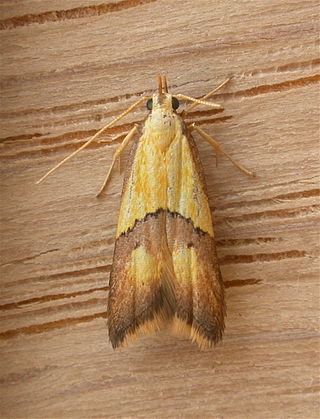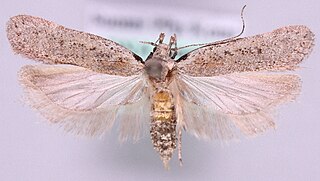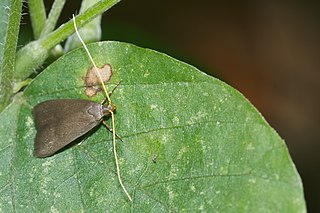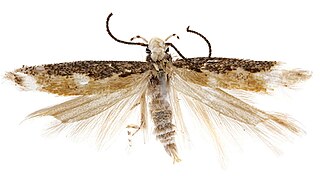
The Lecithoceridae, or long-horned moths, are a family of small moths described by Simon Le Marchand in 1947. Although lecithocerids are found throughout the world, the great majority are found in the Indomalayan realm and the southern part of the Palaearctic realm.

Aristotelia is a genus of moths in the family Gelechiidae. Well-known species are food plant specialists, and diverse hosts are used – Salicaceae, Solanaceae, Rosaceae, Fagaceae, Fabaceae, Asteraceae.

Dichomeris is a genus of moths in the family Gelechiidae erected by Jacob Hübner in 1818.

Gelechia is a genus of moths in the family Gelechiidae. The type species is Gelechia rhombella.

Helcystogramma is a genus of moths in the family Gelechiidae. The genus was erected by Philipp Christoph Zeller in 1877.

Glyphidocera is a genus of moths in the family Autostichidae.

Thiotricha is a genus of moths in the family Gelechiidae, subfamily Thiotrichinae.
Xystophora is a genus of moths in the family Gelechiidae.

The Lecithocerinae are a subfamily of small moths in the family Lecithoceridae. They are found worldwide, but most species occur in South Asia. The subfamily is characterized by the male genitalia with a bridge-like structure connecting the tegumen and the valva, and the uncus almost always is vestigial with two lobes at the dorsal base, only exceptionally united into a broad plate, but never as a thorn or spine.

Eudonia is a large and widespread genus in the grass moth family (Crambidae), subfamily Scopariinae. There is no common name for the roughly 250 species placed here; new species are still being described regularly. Although the genus was proposed early in the 19th century, many of these moths were for a long time retained in Scoparia, the type genus of the subfamily and a close relative of Eudonia. A few small genera have been proposed for separation from Eudonia, but given the size of this group this is not particularly convincing; thus, all are retained here pending a comprehensive phylogenetic review.

Crocanthes is a genus of moths in the family Lecithoceridae.

Lecithocera is a genus of moths in the lecithocerid subfamily Lecithocerinae. The genus was erected by Gottlieb August Wilhelm Herrich-Schäffer in 1853.
Asymphorodes is a gelechioid moth genus in subfamily Agonoxeninae of the palm moth family (Agonoxenidae), whose taxonomic status is disputed. Alternatively, the palm moths might be a subfamily of the grass-miner moth family (Elachistidae), with the Agonoxeninae becoming a tribe Agonoxenini.

Xystophora pulveratella is a moth of the family Gelechiidae. It is found from central and northern Europe to the Ural Mountains and southern Siberia.

Gelechiinae is a subfamily of moths in the family Gelechiidae. It was described by Henry Tibbats Stainton in 1854.
Xystophora asthenodes is a moth of the family Gelechiidae. It was described by Edward Meyrick in 1923. It is found in north-western India.
Apatetrinae is a subfamily of moths in the family Gelechiidae. The subfamily was described by Edward Meyrick in 1947.
Stomopteryx splendens is a moth of the family Gelechiidae. It was described by Otto Staudinger in 1881. It is found in Asia Minor.
Chlamydastis is a genus of moths in the subfamily Stenomatinae.










